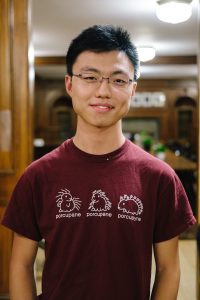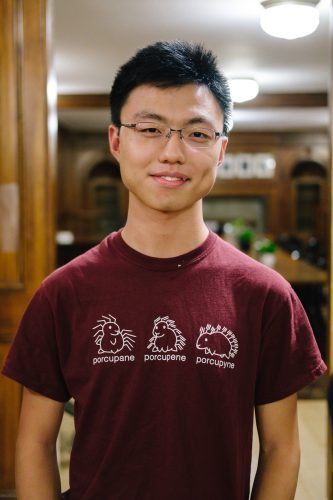Scientists are often stereotyped as people buried deep in research papers and focused singularly on the pursuit of science—but this is hardly the case for current Yale senior Peter Wang (TD ’18). Although he is majoring in Molecular, Cellular and Developmental Biology, his interests range from photography and poetry to violin-playing and graphic design. Science first caught his attention in middle school, but he actually wanted to be an architect when he was younger. “I got interested in appreciating structures, appreciating how things connect and form,” Wang said. This interest ultimately steered him towards science—specifically, to biomolecules. “The complexity and sheer scale of molecules are incredible,” he said.
Wang’s scientific endeavors took off at Yale. Here, he has been able to engage in cutting-edge RNA research: the summer after his freshman year, Wang began working on methods to decipher the interactions and conformations of long non-coding RNAs in Matthew Simon’s lab. These RNA molecules play various important roles in cells, such as regulating gene expression, so studying their structures and functions is a worthwhile endeavor. He has thrown himself into this research with a fervent passion, as evidenced by the multiple independent research projects he is currently juggling within the lab and his recent second-author publication in ACS Biochemistry.

Not only is Wang passionate about studying science himself, but he also wants to make science more accessible to others. In fact, his interest in communicating biology drove him towards graphic design. “Biology, because of its complexity, relies on a lot of concepts and processes that you need very clear visual tools to help people understand,” Wang said. He believes that in many cases, art is one of the most effective ways to improve science communication to the general public.
In a similar vein, Wang has tried to improve the accessibility of research to students at Yale. He, along with his teammates at the Yale Undergraduate Research Association (YURA), felt that students were struggling to find suitable research mentors while searching through faculty listings because of the variations in department website layouts. Key information, such as faculty research interests, was sometimes difficult to find. To this end, he led a five-person team in a yearlong endeavor to build the YURA Research Database, the first of its kind at Yale. This database gives students an easy way to sort through professors and their research interests. Developed under Wang’s guidance, the YURA Research Database is now an invaluable tool for students looking for research mentors at Yale, and another new, improved version is in the works.
Wang is also an avid environmentalist. As president of the Yale Student Environmental Coalition, he helped send four Yale student observers to the 2015 United Nations Climate Change Conference in Paris. He was a participant in The GREEN program, through which students learn more about the environment by global exploration. With this program, he traveled to Iceland and Hawaii—places that have adopted virtually fully renewable energy standards—and learned more about how their communities maintain sustainable lifestyles. Along the way, he built friendships with locals, learned more about their cultures, and experienced the natural beauty these places provided.
Outside of exploring science, Wang also enjoys exploring the world. Most recently, he went on a month-long solo trek in Europe. “I had never been to Europe. I wanted to travel. I wanted to explore somewhere I’d never been,” Wang said. He plotted a ten-city path through Europe, using Airbnb to find places to stay. “That was probably the most adventurous, exciting, packed, and happy month of my life,” Wang said. One of the most memorable moments of his journey took place at a train station in Zürich. “The sunset reflected gold on the rail tracks, and the late evening trains brought back tired, home-bound people from their work. It kind of encapsulated a lot of what that trip was—catching beautiful sights, and feeling what home felt like for different people around Europe,” Wang said.
Wang is currently working on applications to graduate school. In ten years, he hopes to be working in academia on exciting projects in a lab with people he enjoys being around, all the while making meaningful contributions to science. He is not certain if he will be working on non-coding RNA in the future, but he would not hesitate to continue investigating it after graduation if the opportunity arises.

